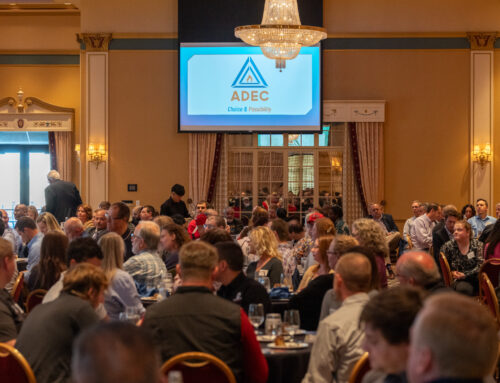Oftentimes when ADEC employees and clients represent ADEC in the community, someone will ask what ADEC means. In this installment of The Story of ADEC, we will dive deeper into our organization’s history and learn how we became known as ADEC and what the meaning is behind this moniker.
ADEC traces its first beginnings to 1952 when a small group of concerned parents founded the Council for the Retarded of Elkhart County, Inc. These parents worked together to offer classes and deepen their children’s educational experiences. They soon purchased a home to use as a school building.
Just one year later, a group of women passionate about education founded the Elkhart County Crippled Children’s Society. Through their efforts, the Rehabilitation Center, popularly known as “The Rehab Center,” was constructed and opened as a choice for therapies and classes in the community. Their signature program was a preschool.
In 1958, parents from both organizations worked with community leaders to open the Sheltered Workshop, Inc. This precursor to ADEC Industries served as a place for people with disabilities to come to work each day and lend support to Elkhart’s burgeoning manufacturing community.
In 1966, the Council for the Retarded of Elkhart County, Inc. opened a formal school for children with disabilities. During this time, they took on a new name – Aux Chandelles, “into the light” in French. This demonstrated the change in culture as people no longer hid away their loved ones with disabilities, but instead looked to provide them with the best life could offer.
The Sheltered Workshop and The Elkhart County Crippled Children’s Society merged in 1970, resulting in a name change to The Elkhart County Society for Crippled Children and Adults.
As public schools took on the responsibility of educating children ages 6 to 22 in 1973, Aux Chandelles transitioned to focus primarily on adult services. Leaders from the United Way and Elkhart County took note of this change and felt the two organizations would do well to combine efforts and offer a comprehensive array of services for people with disabilities in Elkhart County.
As a result, Aux Chandelles and The Elkhart County Society for Crippled Children and Adults merged to form the Association for the Disabled of Elkhart County on May 1, 1976. For several years, the organization grew and prospered as new services were introduced and innovative approaches unveiled.
The 1990s brought a wave of changes with the passage of the Americans with Disabilities Act. Focus shifted to “people-first” language and outmoded titles were re-examined across the country. ADEC’s leaders and supporters joined the movement and formed a task force to rename the agency.
After realizing the Association for the Disabled of Elkhart County had a well established identity as ADEC, the task force decided to legally change the name to be simply ADEC. On May 23, 1991, in celebration of 15 years as a unified agency, leadership officially announced a new name and tagline – ADEC . . . Resources for Independence.
In 2013, ADEC’s board of directors and leadership took a close look at ADEC’s name, mission statement and core values. During this process, the tagline “Resources for Independence” was discontinued, but the letters in ADEC took on deeper meaning as core values for us all to strive to achieve each day.
So, finally, in answer to the initial question, when someone asks me what ADEC stands for, I speak to the history of the organization, but I point to these four values. To me, there’s no greater explanation of what we do and why.
A Life of Their Own: ADEC clients deserve a chance to . . .
Make their own choices
Pursue their passions
Learn new skills
Develop healthy personal relationships
Make a positive contribution
Dignity: ADEC clients are entitled to . . .
Respect and professionalism as their daily needs are met
Protection from exploitation and abuse
Employment: ADEC clients deserve the opportunity to . . .
Find dignity and meaning in work
Make productive contributions to the community through work
Contribute to the well being of our society by being tax-paying citizens
Community: As an active part of the community, ADEC . . .
Connects clients with local opportunities when possible
Is a catalyst for new client opportunities if they don’t exist











